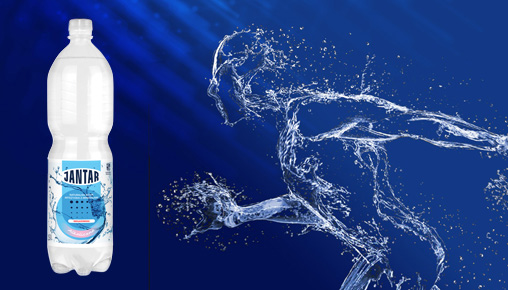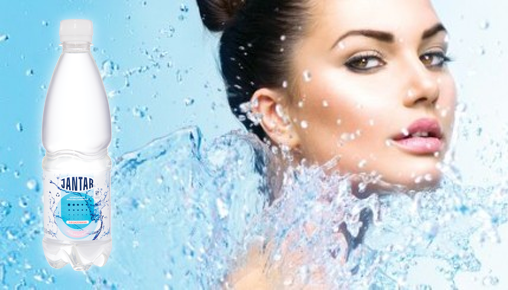Water like no other

Mineral and spring water. Carbonated and still. Poured into a glass straight from the tap, or, increasingly popular, water in glass bottles. Or maybe alkaline water? If you are wondering what the healthiest drinking water is, be sure to read this article. We will dispel any doubts!
2 hydrogen atoms, 1 oxygen atom – if we analyse only the pure water molecule H20, they are all the same. However, when we compare two mineral water molecules in terms of element saturation, they will differ from each other.
Water constitutes 60-70% of an adult’s body weight, 75% of a child’s body weight, and in the case of a newborn – over 80%. These numbers show how important a role it plays in the human body! Without it, our body would not function properly. Water is a carrier of nutrients for our cells, essential in important metabolic processes. It is a solvent that is a kind of means of metabolic transport in the human body. What does it mean?
Well, water dissolves, among others, nutrients from food, by-products resulting from our body’s metabolism, hormones and enzymes. Even maintaining the correct body temperature is supported by water. The creation of new cells and tissues will not take place if there is no water. These four functions show that neither man nor any other organism can survive without it.
Composition of mineral water – what should we know?
Due to the fact that water plays so many important roles in our body, the question arises: which water to drink? To answer them, we should first know what regulations regulate the mineral and spring water market in Poland. Every water producer should meet formal criteria that guarantee the highest quality and safety of bottled water. They are precisely described in the following legal acts:
- Act of 25 August 2006 on food and nutrition safety
- 466 Regulation of the Minister of Health of March 31, 2011 on natural mineral waters, spring waters and table waters
- 565 Regulation of the Minister of Health of April 13, 2006 on the scope of tests necessary to determine the medicinal properties of natural medicinal raw materials and the medicinal properties of the climate, the criteria for their assessment and the model certificate confirming these properties.
Secondly: we should carefully read the label on the packaging. Let’s read: what cations and anions are found in water? What is the total mineralization of water in the bottle? Water producers in Poland divide it according to the level of saturation with minerals. According to this criterion, the following division of bottled water applies:
- low mineralized (up to 500 mg)
- moderately mineralized (501–1500 mg)
- highly mineralized (above 1500 mg)
The next division is: still water, with natural CO2 content and saturated with CO2 (carbonated water). And although, of course, as with any food product, bottled water should be tasty – its health-promoting properties are equally important when choosing natural mineral water. It’s worth remembering!
Good water, what is it?
Unfortunately, the information contained on the label does not give us a complete picture of a given mineral water. Additionally, we should check whether the water producer has up-to-date microbiological tests, extensive physico-chemical analysis, as well as measurement of the natural radioactivity of water. The analysis of water samples should be performed in an accredited laboratory. The frequency of their implementation is a maximum of once every two years. Through all this research we obtain the following information:
- the exact composition of a given water in the bottle with the total value of mineral salts and the pH of the water
- information on the presence of heavy metals, pesticides, nitrites, nitrates, radioactive elements (radium, radon, uranium) and alpha and beta radiation
By verifying all this information, we can determine what class the water in the bottle is and whether we should choose it for ourselves. Unfortunately, most water producers in Poland do not provide us with such tests. As a result, as consumers, we are not 100% sure what we are drinking. As buyers, we have every right to demand this information from manufacturers, so let’s do it. Our health is at stake!
There are also producers who indicate the name of the source on the label contrary to the regulations. Inconsistent because: “If the trade name (invented) of natural mineral water differs from the proper name of a well or a specific intake or place of extraction of this water, the designation of this place or the name of the well or a set of holes forming the intake must be written in a font whose height and width constitutes at least 1.5 of the height and width of the largest font used in this trade name” (466 Regulation of the Minister of Health of March 31, 2011 on natural waters minerals, spring waters and table waters, chapter 2, §7 point 3).
Water for athletes: what to pay attention to?
Are you wondering what water to drink every day? After consulting with outstanding doctors (experts in many fields: nephrology, diabetology, hypertension, cardiology, neurology, endocrinology, and even pediatrics, clinical and sports medicine) about water, they agreed that the mineral water we drink should contain electrolytes: sodium, potassium, magnesium and calcium.
Water cannot be deprived of sodium and potassium, because these two electrolytes are responsible for the proper functioning of our body’s sodium-potassium pump. To be more precise: a person loses most of these elements when he sweats. Sodium deficiency can lead to a disease condition – hyponatremia, and consequently to many disorders and even death. Hyponatremia most often affects athletes, but not only – it can also occur in people with diabetes. People who suffer from ailments such as vomiting or diarrhoea are particularly at risk.
Hyponatremia is caused not only by rapid dehydration, but also by drinking fluids with a low sodium content. Water with a low sodium content or even no sodium dilutes body fluids, which further eliminates sodium from the body. That is why it is so important what we drink during training and during increased physical activity. The best mineral water for athletes is one that is appropriately saturated with key minerals.
Who is low-mineralized water for?
Water producers and distributors who offer low-sodium water (up to 40 mg/l of sodium, i.e. virtually no sodium) argue that you should drink water with a low sodium content, because sodium has a negative impact on our body. According to them, such water should be drunk especially by people with hypertension, diabetes, cardiac diseases, and urinary tract stones. Can we consider such opinions credible? Is water with a low mineral content healthier?
As Dr. Zofia Konopielko writes in her August 2016 opinion regarding Jantar mineral water: “These patients should be more afraid of eating three slices of cold meat, chips or hamburgers, light cola, or finally bread from a bakery.” WHO, in turn, states that the daily sodium intake for an adult should be 1,500 mg/24h. That’s about 5g of salt. Therefore, we should choose water that contains sodium in the range of 100-200 mg/l.
Even if we accept the thesis that excess sodium is harmful, if we drink properly the amount of fluids of about 2 litters per day (an adult under normal conditions), the amount of sodium in this range is a negligible percentage of the daily requirement for this element. We must remember that low-sodium water, according to the Ministry of Health, is water whose composition does not exceed 200 mg/l of sodium.
Let us also remember that most interventions in the structure of water result in it no longer being water of primary purity, but of secondary purity. This means that a manufacturer of mineral water who makes such a modification can no longer call such a product water, but a water drink. This is precisely defined in the regulations. The reality, unfortunately, is completely different. So again: as consumers, we should make conscious choices – buying bottled water from reliable and honest producers.
What does the pH of the water in the bottle say?
Does the pH of water affect our body in any way? Most bottled water sold in Poland does not have information about the pH level on the label. What does the pH of water tell us? Well, pH determines the reaction of water (below 7 – acidic, above 7 – alkaline). Our blood has a pH of 7.35-7.45. Therefore, we should choose drinking water in the range from 7.2 pH to a maximum of 8.0 pH. Let’s try to reach for still water, because the presence of CO2 in the water itself causes its acidification, i.e. the pH of the water drops below 7.
As Prof. writes in his opinion from January 2017. Ph.D. n. med. Michał Nowicki on the issue of water Jantar: “During physical exercise, especially intense exercise, the metabolism is accelerated and acids are released by the muscles, therefore consuming water with a larger amount of bicarbonates at this time is extremely beneficial and may increase the endurance of the body and its abilities. for long-term efforts. The beneficial properties of alkaline water also find numerous applications in diseases of the digestive system, especially the stomach.
Choose bottled water that does not contain any heavy metals, pesticides, nitrites, nitrates, radioactive elements (radium, radon, uranium) or alpha and beta radiation. All these substances have a very negative impact on our health, and most of them are caused by environmental pollution (some of them occur naturally due to the specific geological structure of rocks).
In the light of the information about mineral waters presented above, to summarize the topic, I would like to present the benefits of drinking natural JANTAR water. If you are wondering: what to drink during training? What water is best to drink? The answer is simple. Choose a brand of mineral water that meets the criteria presented. Why is it worth choosing JANTAR water?
- it is moderately mineralized
- as chloride-sodium water, it hydrates quickly and effectively
- has the appropriate level of sodium, potassium and chloride, which ensures the maintenance of internal water and electrolyte balance, which is important especially during physical exercise
- it is characterized by an excellent potassium to sodium ratio (close to that recommended in tests for plasma electrolyte levels), thanks to which it supports the operation of the sodium-potassium pump
- contains HCO3 bicarbonates, which is an excellent factor for athletes improving the absorption of calcium and magnesium
- it has an alkaline pH of 7.4, which prevents the acidification of the body
- does not contain heavy metals or pesticides
- it does not show concentrations of radon, radium or uranium isotopes
- does not show alpha or beta radiation
- does not contain any chemicals that extend the shelf life
Article by Michał Fijałkowski – Harmonia magazine – May-June 2017 issue – “Is water equal to water”
Michał Fijałkowski – sociologist by education, enthusiast of healthy eating and promoter of a healthy lifestyle, managing director of JANTAR Wody Mineralne Sp. z o. o., Kołobrzeg








